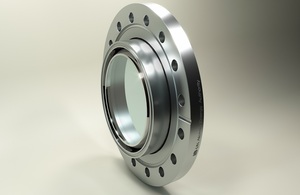UKAEA develops optical viewport technology for quantum physics
UKAEA has improved optical viewport technology - reducing optical distortion by up to 75 percent - for applications such as fusion energy and quantum physics.

A UKAEA ion-trap viewport design, an example of the improved optical viewport capability resulting from the findings of Project Solace.
The UK Atomic Energy Authority (UKAEA) has recently delivered on a UK Government grant to improve optical viewport technology – reducing optical distortion by up to 75 percent – for applications such as fusion energy and quantum physics research.
As a vital part of its research into fusion energy, UKAEA’s Special Techniques Group (STG), has built expertise in producing high-performance optical viewports used on fusion machines.
UKAEA’s Special Techniques Group, supported by the UK Government Office for Technology Transfer (GOTT) – Knowledge Asset Grant Fund – recently completed Project Solace, to further enhance viewport performance for other sectors such as quantum physics.
Project Solace focused on gathering expert feedback from optical viewport users about what parameters are important to them and developing new modelling tools to optimise new viewport designs to meet these requirements.
The feedback from quantum physics customers was that optical flatness of viewports was most important to reduce distortion of measurements coming from trapped atoms. Customers also appreciated UKAEA’s Special Techniques Group’s custom engineering which enables customisation of viewport shapes to fit microscopes, magnets and other instrumentation.
Following the development of the new modelling tools, the Group engaged Frazer Nash Consultancy to evaluate multiple viewport design options and identified opportunities to reduce optical distortion by up to 75 percent compared to baseline design.
Commenting on the funding, Alison Campbell, CEO of the UK Government Office for Technology Transfer, said: “I’m delighted that the Knowledge Asset Grant Fund has been able to support UKAEA to expand the application of its unique technology, delivering value to its customers. The fund, and our work in GOTT, is focussed on helping organisations across government, such as UKAEA, realise the value and impact from exploiting their expertise and Knowledge Assets. We look forward to continuing to support the project as it develops.”
Tim Bestwick, Deputy CEO for the UKAEA, said: “The unique technical challenges posed by fusion research has driven UKAEA’s Special Techniques Group to develop optical viewports that operate under extreme conditions with minimal optical distortion, and we have been able to prove these in fusion experiments.
“The team now plans to design and produce ultra-low distortion optical viewport designs for the next generation of quantum computers and sensors.”
These designs will be available for different sectors and global markets, including aerospace, beam-line science and high-power laser applications, to provide solutions to manufacturing challenges.
More information on the UKAEA Special Techniques Group
The challenges of manufacture for fusion energy include unusual materials, and extremes of pressure and temperature. Similar challenges are shared in many academic and industrial applications.
Using the expertise gained in the field of fusion research, the UKAEA Special Techniques Group frequently collaborates with other sectors such as aerospace, beam-line science and high-power laser science to provide solutions to their manufacturing challenges.
It has developed an excellent reputation for producing high-performance optical viewports for vacuum applications such as fusion energy and quantum physics research. UKAEA Special Techniques Group’s diffusion bonding process allows the precision assembly and high integrity joining of optical materials like fused silica, quartz, sapphire, and diamond to a variety of metals such as stainless steel and titanium.
Optical viewports developed by the Group have such optical clarity that lasers can be applied through the viewports, into an ultra-high pressure vacuum environment, to manipulate atoms at a quantum level.
UKAEA collaborated with Atkins to develop new modelling tools to optimise viewport designs and with Frazer Nash Consultancy to use Bayesian optimisation techniques to evaluate viewport designs.
As a result of Project Solace, the UKAEA Special Techniques Group have launched a standardised range of new optical viewports that cater to popular geometries. A selection of available viewports can be found online.